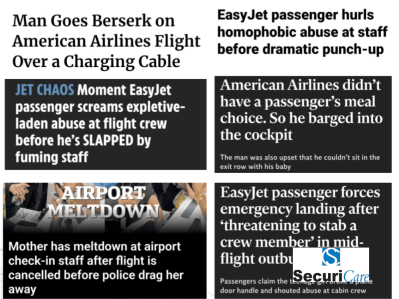Air-Rage: Why Cabin Crew Training and Response Matters More Than Ever
Published At: Fri 29 Aug 2025

Unruly passenger incidents, or "air-rage" as it’s often referred to, continue to make headlines worldwide. A recent case in the US highlighted once again the constant scrutiny airline staff are under. Every movement, word and decision by cabin crew is observed by passengers, regulators and increasingly by social media. Their actions shape how those incidents are remembered and judged. Positive witnessing is essential.
These high-profile events underscore a truth that applies everywhere: cabin crew behaviour is under the microscope and professional, consistent responses are critical to safety and confidence in aviation.
Rising Incidents: The Numbers Behind the Headlines
Industry and regulator data points to a worrying trend unruly passenger incidents are becoming more frequent and more severe:
2021: 1 incident per 835 flights
2022: 1 incident per 568 flights
(Source: UK CAA, US FAA & EASA)
Analysis by IATA highlights the most common causes of non-compliance incidents, which continue to challenge airlines worldwide:
-
Smoking (cigarettes, e-cigarettes, vapes, puff devices) in cabins or lavatories
-
Refusal to fasten seat belts
-
Exceeding cabin baggage allowances or refusing to stow luggage
-
Consumption of personal alcohol on board
Each of these behaviours can escalate quickly without effective intervention, creating risks for crew, passengers and airline reputation.
Pressure on the Frontline
Cabin crew are expected to manage these situations while still delivering service, maintaining safety and reassuring passengers, often in cramped conditions and under the lens of mobile phone cameras. It’s a uniquely high-pressure role.
Airlines are increasingly being asked whether they do enough to prepare and support their staff. High quality training goes a long way towards ensuring that airline staff are prepared for unruly passenger incidents but crew also need regular refreshers, structured debriefs after challenging flights and reassurance that their airline will support them when tough decisions are made. Without that support, dealing with stressful incidents can quickly impact confidence.
New Challenges: Responding to Passengers with Additional Needs
The underlying causes and functions of unruly passenger behaviour can be complex and passengers, young and old, can have special needs. Recent incidents Our UK airline customers have also highlighted an emerging trend: behaviours of concern incidents involving children with emotional and behavioural difficulties. In these cases, the role of the parent, guardian or carer becomes central to the response strategy. Crew need to balance safety and compliance with sensitivity, ensuring they involve the responsible adult and de-escalate without creating unnecessary distress or additional trauma.
These situations underline the importance of tailored training, preparing staff not only for conflict management and de-escalation but also for scenarios where compassion and inclusion are just as vital as authority.
Why Ongoing Training is Key
The long-term trend is clear: disruptive passenger behaviour is not going away. If anything, the pressures of modern life are making it worse. That’s why continuous, practical training in conflict resolution, behavioural awareness and collaboration between police and airlines remains essential.
At SecuriCare, we’ve seen how the right preparation empowers crew to act decisively, involve other authorities appropriately and manage situations in ways that protect everyone’s safety, while maintaining professionalism under scrutiny.
Air-rage may grab headlines but behind the scenes, it’s the crew’s skill, confidence and judgement that make the real difference.
